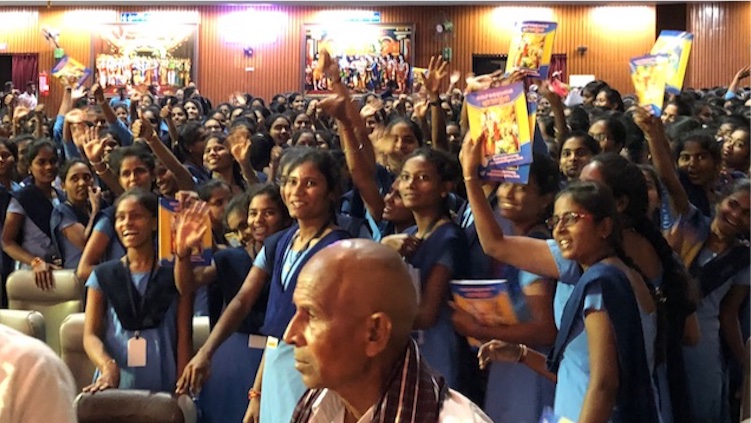New School Textbook Teaches Success in Life Through Bhagavad-gita
By Madhava Smullen | Mar 05, 2019

A new textbook for schools in the Telegu language, entitled “Bhagavad-gita for Complete Success in Life,” has been written by an ISKCON devotee and published by the Tirumala Tirupati Devasthanam (TTD), the organization that manages the famous Venkateswara temple.
Author Vaishnavanghri Sevaka Das, a scientist in the polymer industry who translates Prabhupada’s books into Telegu in his spare time, feels that this collaboration would be very much appreciated by Srila Prabhupada.
“In 1974, when Prabhupada visited the Venkateswara temple, he was very impressed by their infrastructure and organization,” Vaishnavanghri says. “He said that the TTD with its infrastructure and ISKCON with its preaching potency should join together and spread the message of the Bhagavad-gita all over the world. So I see that this is the manifestation of that.”
Pola Bhaskar, joint executive officer of the TTD, approached Vaishnavanghri Sevaka with the idea and fast-tracked it to publication.
The book was released on Gita Jayanti day, December 18that the prestigious Mahati Auditorium in Tirupati, where it was distributed to over 2,000 students. Vaishnavanghri Sevaka Das also spoke at the event, to an uproarious reception.
“Bhagavad-gita for Complete Success in Life” is aimed at sixth, seventh and eight standard students – ages 12 to 14.
Twenty-five thousand copies have been published so far, and the goal is to distribute them for free to students in all the schools in Telangana and Andhra Pradesh, India’s two Telegu-speaking states.

The cover of Bhagavad-gita for Complete Success in Life
The book is presented in such a way that students who have never read the Gita can understand it, apply it in their lives, and remember what they have learned throughout their lives.
It seeks to dispel incorrect notions of the Bhagavad-gita popular in the Telegu region – for instance, that reading it will make people become mendicants or take up violence, or that it should only be recited at funerals. Instead, it presents the Gita as a success manual.
Vaishnavanghri’s book is divided into three sections. The first, entitled “disciplined work,” is based on the first six chapters of the Bhagavad-gita, wherein Lord Krishna talks about action, or Karma Yoga.
Topics covered include “Bhagavad-gita is the basis for leadership;” “No more weakness of heart;” “Expertise in work is called yoga;” and “Progress in life with the knowledge of four quotients.”

Author Vaishnavanghri Das and other devotees speak at the book’s launch at Mahati Auditorium
With these four quotients Vaishnavanghri launches a fascinating model for progress that runs throughout the book, based on Bhagavad-gita 3.42: “The working senses are superior to dull matter; mind is higher than the senses; intelligence is still higher than the mind; and he (the soul) is even higher than the intelligence,” Krishna says.
This concept is illustrated in the book with four connected circles which form one large circle. Each smaller circle has the abbreviations “EQ,” “SQ,” “IQ,” and “PQ,” which stand for the mind or emotional quotient, soul, intelligence, and body or physical.
“The general orientation of any common man is the mind or emotional quotient on top, the soul on the bottom, intelligence on the left and body on the right,” says Vaishnavanghri. “The first section of the book explains how ‘Disciplined Work’ means taking your mind out from the driver’s seat and putting your intelligence in its place – this is what Krishna describes in the first six chapters of the Gita. So we rotate the circles 90 degrees, putting the IQ on top, and PQ on the bottom.”
The next section, based on the second six chapters of the Bhagavad-gita, tackles Bhakti Yoga and is called “Dedicated Work.” Among the topics discussed are “Giving and taking with Krishna;” “The goal in mind, and intelligence on the goal;” and “Leadership qualities.”
In this section, students learn how to rotate the circles again, moving SQ or the soul to the top, EQ or mind to the bottom, PQ or body on the left, and IQ or intelligence on the right.
This is the perfect orientation according to Lord Krishna, who says: “Thus knowing oneself to be transcendental to material senses, mind and intelligence, one should control the lower self by the higher self and thus—by spiritual strength—conquer this insatiable enemy known as lust.”

Vaishnavanghri Das shows the book to ISKCON Communications Director Anuttama Das and his wife Rukmini Dasi
The final section of the book, based on the last six chapters of Bhagavad-gita, deals with Jnana Yoga, which Vaishnavanghri dubs “Diligent work.” Topics covered are: “What is knowledge, and what is the benefit of knowledge;” “Power in consciousness;” “You are not completely independent;” “Three types of pleasures;” and the conclusion, “Let all victory be unto you.”
Here Vaishnavanghri also gives practical models and action plans for keeping the soul in the driver’s seat, and stopping the mind from taking back its old place. “Diligent work means fixing this orientation, putting screws into all four sides so that it does not move and you are permanently fixed up,” he says.
Looking to the future ISKCON India plans to use its considerable book distribution teams to distribute the textbook to all Telegu-speaking schools. Beyond that Vaishnavanghri hopes to travel overseas to introduce the book to Telegu-speaking people in other countries such as the USA.
“The goal is to give students a way to become more action oriented, with a Krishna conscious base,” he says.

The first part of the book, disciplined work, shows how to move the EQ, or mind from the driver’s seat and replace with the intelligence, or IQ















